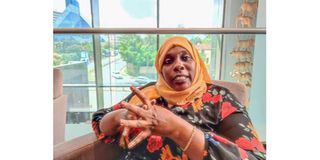Breaking News: Former Lugari MP Cyrus Jirongo dies in a road crash
Raya Famau: Real change begins with activism

Raya Famau, an environmental activist in Lamu County, during the interview at a Nairobi hotel on May 31, 2022.
What you need to know:
- President Uhuru Kenyatta awarded her a certificate of recognition as a 'Shujaa' of Lamu County during the Mashujaa Day celebrations held in Mombasa.
- Her venture into activism has seen her defy the odds. She says, women’s responsibilities under Islam are limited to indoor-cooking and taking care of their families.
Raya Famau married at 20, only to be divorced three years later.
Before her marriage in 2000, they had agreed that she would find a job to support her parents. She had trained as a community nutritionist. She then joined her husband in Nairobi, where he was working.
“But the moment we got married, he said ‘No, I want a housewife,’” she recalls.
“That is when my problem started. For three years, I was undergoing a lot of stress [and] frustrations. I wanted to go back to college, [but] he refused. Luckily, we got divorced.”
She had to return to her poor parents in Lamu, starting all over again—a turning point, not just for her, but for her community. It started with the awakening reality of having to struggle to experience menstruation with dignity. “I wouldn’t afford a Sh100 sanitary pad. I had to ask my mom for money.”
The experience jolted her. She had to find means of providing for herself. A search for a solution landed her at Kenya Red Cross, Lamu branch, as a volunteer. She was attached to Lamu District Hospital, now Lamu County Referral Hospital. At the end of the month, she got a stipend that covered her expenses.
Advocacy
During the time, she felt the push to get into activism. “I felt like I needed to do activism and help other suffering women.”
Now, Ms Famau is a renowned environmental activist and a founding member of Save Lamu, a coalition of community-based organisations.
In December 2019, Coast Woman Magazine feted her as woman activist of the year. This was after President Uhuru Kenyatta awarded her a certificate of recognition as a 'Shujaa' of Lamu County during the Mashujaa Day celebrations held in Mombasa.
Her venture into activism has seen her defy the odds. She says, women’s responsibilities under Islam are limited to indoor-cooking and taking care of their families, and not going out to protest against violation of rights.
Her defiance has been beneficial to herself and her community. Firstly, she went back to school—Technical University of Mombasa—and started with a certificate in community development and counselling. She later advanced to a diploma. And finally, she has Bachelor of Development Studies from the same institution.
Ms Famau was married just after she finished her certificate in community nutrition, but when she volunteered at the hospital, she felt working in a health facility was not her forte, hence the switch of the course.
Secondly, under Save Lamu, she participated in petitioning the government against establishing a 1,050MW African Development Bank-funded coal plant in the Kwasasi area of Hindi/Magogoni sub-county.
In 2016, the coalition, alongside other petitioners, filed a suit against the National Environmental Management Authority (Nema) and Amu Power, the company that was to establish the plant, at the National Environmental Tribunal in Nairobi.
The ruling was made in 2019, with the tribunal suspending the environmental impact assessment licence that Nema had issued to the company. It was a judgment preceded by aggressive advocacy.
“We did demonstrations in Lamu [and] Nairobi. We travelled to African Development Bank to advocate that our government needs to stop this project.”
Education
She says her near two-decade advocacy work has inspired many Lamu girls and women into pursuing education and speaking out against human rights violations.
In 2021, she founded Lamu Women Alliance, through which she is spearheading empowerment of women and girls. She runs projects on girls’ education, women economic empowerment, climate change and sexual and reproductive health.
But then, her activism has turned out to be sinking her in some deep waters. She says the national and county governments fear employing her as the officials have labelled her “a stubborn woman”, yet she applies for state jobs for which she is qualified.
For now, she is making ends meet from a portion of the seasonal grants her organisation receives to implement projects. Nevertheless, she is looking beyond the challenges.
“The future is bright for the women in Lamu. Even though we are struggling, I know [there is light] at the end of the tunnel, and we will get positions. We will work with the government and our voices will be heard,” she says.





